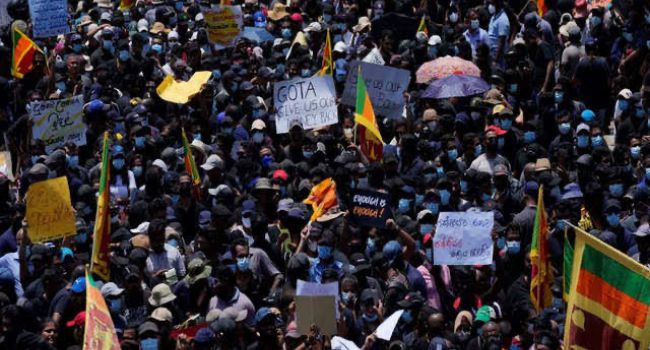International
Strike by trade unions cripples crisis-ridden Sri Lanka

A general strike by all trade unions in crisis-ridden Island nation of Sri Lanka on Thursday, has crippled the fragile economy of the country as demands for President Gotabaya Rajapaksa and his family members to resign over the country’s worst-ever economic crisis grows.
The nation of 22 million people has been hit by months of acute shortages of food, fuel and medicines, prompting widespread protests and Thursday’s strike, which is the first time the entire country has been brought to a standstill since the demonstrations began, has threatened to bring everything to a standstill.
Public transport was stopped, school attendance dropped and shops and offices remained closed across the country, police and regional officials said.
President Rajapaksa is due to meet political party leaders on Friday to discuss the crisis while Prime Minister Mahinda Rajapaksa, Gotabaya’s elder brother and a former two-term president, reiterated his confidence that he would not be fired over the crisis.
More than 100 trade unions, some affiliated to the Rajapaksas’ ruling Sri Lanka Podujana Peramuna (SLPP) party, joined the general strike, whose participants are demanding that the president, prime minister and other senior officials resign.
Read also: Sri Lanka begs IMF for urgent financial assistance
“Today is like a public holiday in the country. Hospitals are treating only emergency cases,” a police official monitoring the island-wide situation said.
The country’s economic crisis took hold after the coronavirus pandemic hammered income from tourism as well as remittances from Sri Lankans abroad with the protesters blaming the Rajapaksa clan for years of mismanagement of the country.
The government has defaulted on its $51 billion external debt and is in talks with the International Monetary Fund for an emergency bailout and unable to pay for fuel imports, and utilities have imposed lengthy daily blackouts to ration electricity, while long lines snake around service stations as people queue for diesel, petrol and kerosene.
Join the conversation
Support Ripples Nigeria, hold up solutions journalism
Balanced, fearless journalism driven by data comes at huge financial costs.
As a media platform, we hold leadership accountable and will not trade the right to press freedom and free speech for a piece of cake.
If you like what we do, and are ready to uphold solutions journalism, kindly donate to the Ripples Nigeria cause.
Your support would help to ensure that citizens and institutions continue to have free access to credible and reliable information for societal development.
























